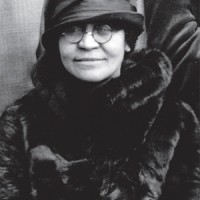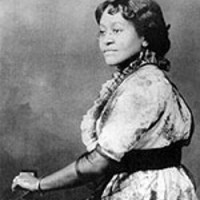Molly Crusen Bishop: Annie Turnbo Malone, early entrepreneur
- Details
- Published on Thursday, 04 February 2016 17:36
- Written by Molly Crusen Bishop
One of the most brilliant minds to ever come out of Peoria, Illinois was Annie Turnbo Malone. Separated from slavery by a single generation and a graduate of Peoria High School, she was one of the first African American women to attain the official status as millionaire.
Annie Turnbo was born in 1869 in Metropolis, Illinois. Her parents, Robert Turnbo and Isabella Cook Turnbo, escaped from slavery in Kentucky. Robert went on to fight for the Union in the Civil War, and Isabella traveled dangerously along the Ohio River until they were able to settle in Metropolis, Illinois.
Annie’s courageous parents died young, and she was sent to live with an older sister who was living in Peoria. She attended Peoria Central High School, where there is still a picture of her hanging because she is regarded as a special alumnus. While receiving her education there, she found she had a natural interest in chemistry, which would help lead to her eventual success.
During the late 1800s many of the products available to African American women for their hair and skin caused discomfort, some even causing burns and hair loss. Annie wasn’t satisfied with the products available and began to use her knowledge in chemistry to invent her own hair and skin products. Her first successful product was called “Wonderful Hair Grower.”
Times were extremely difficult for African Americans in business in the 1890s and early 1900s, yet Annie figured out ingenious ways to succeed.
Some stores refused to sell her products, so she developed incredible marketing skills. Annie and her sisters began door-to-door selling and travelled from Peoria to Lovejoy (now Brooklyn, Illinois) and then on to Chicago and St. Louis. They had women sample the products and often gave the product away for free to establish rapport and ensure future paying customers from the good will.
Annie trained new recruits and taught them her strategies. It took off like wildfire. She held informational meetings and paid to advertise in African American newspapers. She gave demonstrations of her products at church groups and clubs for African Americans.
In 1902, Annie began to hire assistants in St. Louis and soon launched her own hair and beauty school there. That school was one of the first colleges for African American women, and it was called Poro College. The college held an auditorium, diners, and employed hundreds of African American women.
Poro is a West African word meaning “physical and spiritual growth,” and that was the attitude that Annie held over her school. Those standards of education and beauty would help the women’s status rise and help cement its place in the community. Thousands of African American women would benefit from Annie’s college, which in turn helped her business acumen.
After her success in St. Louis, Annie brought more of her business to Chicago. At one point she owned an entire city block, which came to be called the “Poro Block.” Eventually her business enterprises spread throughout the world and thousands of women graduated from her programs. Around the early 1920s Annie’s net worth was approximately $14 million.
In spite of her multi-millionaire status, and the fact that she was one of the first African American philanthropists, Annie lived modestly and generously supported charities all over the United States, including the Howard University College of Medicine. She started scholarships that benefitted women for many generations.
One charity Annie was most passionate about was the St. Louis Orphans’ Home. She was the board president for the home from 1919 to 1943 and donated $10,000 for the building fund. In 1946 the name was changed to the Annie Malone Children and Family Service Center. It is still in existence today and the mission for the center remains focused on improving the quality of life for children, families, and the community. It remains a perfect match for Annie’s life as a business woman who educated, invented and gave back to the community by her time, energy, and philanthropy.
Annie was honored by the city with a street named after her, and St. Louis still and holds a parade every year in May to celebrate her giving spirit.
In 1923 Annie donated $25,000 to help build the Saint Louis Colored YWCA as African Americans were regularly denied access to many services and clubs all over the country. Her college and businesses offered economic independence for African American women when other options were slim to none. Annie also financed two full-time scholarships at every black college and university across the United States. She is an honorary graduate of Howard University, which is a historically black college in Washington D.C.
Annie died in Chicago in 1957. A combination of her generosity with charities and a divorce and lawsuit that resulted in her husband being awarded a large portion of her company’s worth, left Annie’s estate at the time of her death a small fraction of what it had once been.
Annie left instead a legacy of charity and kindness, as well as her business sense. She was able to build an empire focused specifically around African American women and was greatly successful in planting seeds of future success.




















































